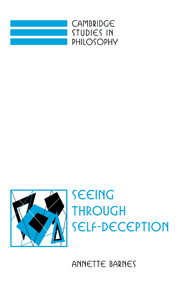Book contents
- Frontmatter
- Contents
- Acknowledgments
- Introduction
- 1 Other-deception
- 2 Two models of self-deception
- 3 The need for an alternative model of self-deception
- 4 Functioning to reduce an anxiety; satisfying a desire
- 5 Self-deceptive belief formation: non-intentional biasing
- 6 False consciousness
- 7 Intentional and non-intentional deception of oneself
- 8 Irrationality
- 9 What, if anything, is objectionable about self- and other-deception?
- References
- Index
5 - Self-deceptive belief formation: non-intentional biasing
Published online by Cambridge University Press: 09 November 2009
- Frontmatter
- Contents
- Acknowledgments
- Introduction
- 1 Other-deception
- 2 Two models of self-deception
- 3 The need for an alternative model of self-deception
- 4 Functioning to reduce an anxiety; satisfying a desire
- 5 Self-deceptive belief formation: non-intentional biasing
- 6 False consciousness
- 7 Intentional and non-intentional deception of oneself
- 8 Irrationality
- 9 What, if anything, is objectionable about self- and other-deception?
- References
- Index
Summary
In self-deception people's anxious desires that q cause them to be biased in acquiring their beliefs that p. In this chapter I discuss a variety of ways in which anxious desires give rise to biases in belief acquisition and the ways in which one can try to resist or prevent or avoid this biasing. While no attempt to resist or prevent or avoid biasing would result in what Hilary Kornblith has called epistemic irresponsibility – we are epistemically irresponsible when we do not do all that we should do to bring it about that we have true beliefs – I take it for granted that even if the charge of epistemic irresponsibility is not always applicable to self-deceivers, the charge of bias is always applicable. As a result of this bias in the self-deceiver's belief-acquisition process, the self-deceiver's belief that p is never justified. A self-deceiver will never have adequate grounds for thinking that his or her belief that p is true.
Dispute in the philosophical literature about self-deceptive belief formation is not to any significant extent dispute about whether a bias operates in the belief-formation process. It is generally acknowledged that biasing occurs. There is dispute about whether the biasing is intentional or non-intentional, and about what the source of the biasing is.
While some theories of self-deception, as David Pears points out, insist on the intentional biasing of belief and postulate “a rational subsystem, perhaps a separate centre of agency, insulated in some way from the main system which largely controls a person's life,” to do the biasing, others argue that the
biassing is sub-intentional: that is to say, it is not planned and is not even the outcome of a plot of which the self-deceiver is unaware. […]
- Type
- Chapter
- Information
- Seeing through Self-Deception , pp. 77 - 97Publisher: Cambridge University PressPrint publication year: 1998



